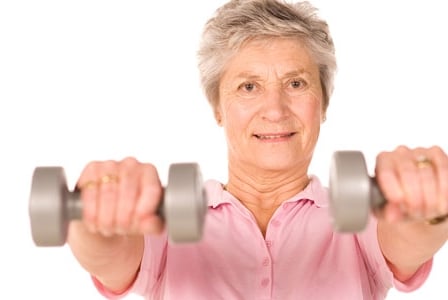
New research suggests that lifting weights and other forms of resistance training may reduce cognitive impairment in women over 70 years of age.
A new study led by University of BC physical therapy professor Teresa Liu-Ambrose suggests that lifting weights and other forms of resistance training may slow cognitive decline in women over 70 years of age.
In their six-month study of 86 women who were between the ages of 70 and 80 years, researchers randomly assigned the participants to twice weekly involvement in one of three different activities:
- 26 did resistance training, including lifting weights, to build muscle strength
- 24 walked outdoors in an aerobics program
- 27 did range of motion and balance exercises and relaxation techniques as a control
Significant improvement with weight training
The women in the study all had mild cognitive impairment and complained of memory problems. According to the researchers the women who were assigned to the resistance training showed “significant” cognitive improvement compared to the control group who did the balance and tone exercises.
They also showed an improvement in associative memory, or the ability of one thought or memory to trigger another (“green means go”), as well as conflict resolution.
“What our results show is that resistance training can indeed improve both your cognitive performance and your brain function,” said Liu-Ambrose.
“What is key is that it will improve two processes that are highly sensitive to the effects of aging and neurodegeneration: executive function and associative memory—often impaired in early stages of Alzheimer’s disease.”
Aerobics improved balance, mobility, and cardiovascular capacity
Although the women who took part in the aerobics training group showed a significant improvement in their general balance and mobility and cardiovascular capacity, they didn’t show the same improvement in cognitive functions as the women who did strength training.
Liu-Ambrose speculated that learning routines involved in strength training, including the number of sets, the repetitions, and maintaining good form, could play a role in bolstering cognitive function, compared to walking, which comes more naturally.
Just remember: just move it
There’s no question though: moving our bodies and staying active—no matter how we do it and regardless of how old we are—is good for our health. But pumping a little iron may just help us to keep remembering this!



